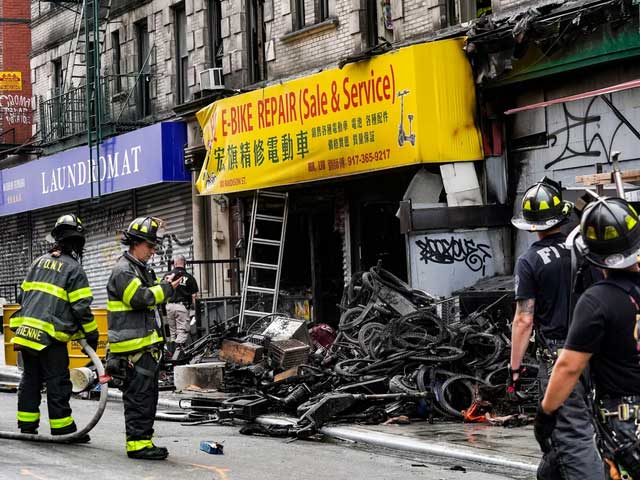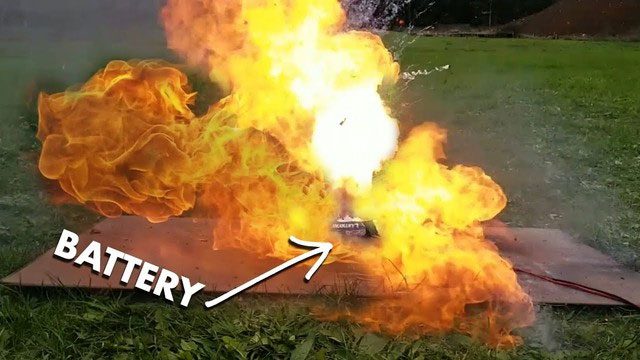The nature of batteries in electric vehicles is quite safe, but remember, you get what you pay for. Batteries are high-tech devices, and if you only spend a few million VND on a battery, you may have purchased a low-quality product.
Series of Fires Caused by Electric Vehicle Batteries
Last March, lithium-ion batteries, found in many popular consumer products, came under tight scrutiny after a major fire in New York City, USA.
At least 7 people were injured in a level 5 fire in the Bronx, which required the mobilization of 200 firefighters. Officials believe the fire was caused by a lithium-ion battery from an electric scooter found on the roof of an apartment building.
Last year, the New York City Fire Department responded to over 200 fires involving scooters and e-bikes, resulting in 6 fatalities.
“In all lithium-ion fires, there is no such thing as smoldering; the fire does not gradually spread but explodes literally,” CNN quoted city commissioner Laura Kavanagh. “As soon as it happens, it’s an extremely large fire that is very difficult to extinguish, making it particularly dangerous.”

Battery-related explosions are becoming more common
Incidents of battery explosions are becoming more frequent for several reasons. First, lithium-ion batteries are now present in almost every consumer technology product, from laptops and cameras to smartphones and electric vehicles.
Additionally, random variables such as manufacturing defects, misuse, and old batteries can increase the risk.
Steve Kerber, Vice President and Executive Director of the Fire Safety Research Institute at Underwriters Laboratories (UL), stated: “Lithium-ion batteries are generally safe as long as there are no defects and the batteries are not damaged or misused. The more batteries that are present in devices around us, the more incidents will occur.”
In 2016, Samsung issued a global recall for the Galaxy Note 7 due to a battery defect that caused the device to catch fire and sometimes explode.
According to the U.S. Consumer Product Safety Commission, HP and Sony also had to recall lithium batteries for laptops due to fire risks, and approximately 500,000 hoverboards in the country were recalled for similar reasons.
In 2020, the Federal Aviation Administration (FAA) banned carrying loose lithium-ion batteries in checked luggage, permitting them only in carry-on baggage with airline approval.
Despite these concerns, lithium-ion batteries will continue to be widely used in many modern devices.

Affordable e-bikes and low-quality batteries are more likely to explode.
Why Are Batteries Flammable?
Chemically, lithium-ion cells undergo a process called thermal runaway, which leads to a significant increase in temperature and pressure within the battery cell, accompanied by the release of flammable gases. These gases can ignite from the high temperature of the battery, leading to rapid fires that are difficult to extinguish and release toxic smoke.
TechCrunch cited experts stating that affordable e-bikes and low-quality batteries—often imported from lesser-known manufacturers in China—are more likely to explode due to lower quality manufacturing processes.
According to Leo Raudys, President and CEO of Call2Recycle, if battery manufacturers cut costs or use cheap materials, the likelihood of defects causing the cells to swell and expand, leading to thermal runaway, increases.
“Remember, you get what you pay for. Batteries are high-tech devices, and if you only spend a few million VND on a battery, you may have bought a low-quality product,” Raudys told TechCrunch.
In the U.S. market, reputable e-bike models typically start at around $1,000. In contrast, many cheaper, lesser-known brands in Vietnam are priced at just a few million VND, raising questions about their quality.
Dylan Khoo, an analyst at ABI Research, noted that e-bikes use batteries that are approximately 50 times larger than those in smartphones. “Therefore, when a fire occurs, it can be much more dangerous,” Khoo stated.
This expert explained that all lithium-ion batteries use flammable materials, and incidents like the one in the Bronx could result from “thermal runaway,” a chain reaction leading to catastrophic fires or explosions.
“The process can be triggered by a battery overheating, being punctured, or electrical failures such as short circuits. In cases of spontaneous fires occurring while charging, it is likely due to manufacturing defects,” he added.

If a fire occurs, people should evacuate and call the fire department immediately rather than attempting to extinguish the fire themselves.
The number of lithium-ion battery fires is rising significantly both in the U.S. and internationally, particularly commonly seen with e-bikes and electric scooters, due to increased purchases of these products during the pandemic.
Expert Kerber recommends that people should buy electric vehicles that are safety-certified from reputable retailers, as purchasing online makes it difficult for customers to know where the products actually come from. If a fire occurs, he advises people to evacuate and call 911 immediately instead of trying to extinguish the fire themselves.
“Fire spreads very quickly, and fire extinguishers are ineffective,” Kerber remarked.
Besides electric vehicles, experts warn that anyone using lithium-ion batteries in other forms should also adhere to proper battery charging and usage guidelines.
According to researchers at the University of Michigan, devices with this type of battery should be charged and stored in dry, cool places, and should not be charged for too long or while sleeping.
Batteries should also be regularly checked for cracks, swelling, or leaks, and people should use the charger that came with the device or one from a reputable supplier. Old batteries should be replaced instead of reselling or reusing them.
In some countries, it is crucial to purchase devices with UL certification, which indicates that the product, including the battery, motor, and charger, has been tested and certified safe.
According to Sridhar Srinivasan, Senior Director at Gartner, while some types of chemical batteries are safer than others, it will still take several more years before a better and safer lithium-ion alternative can be implemented.





















































